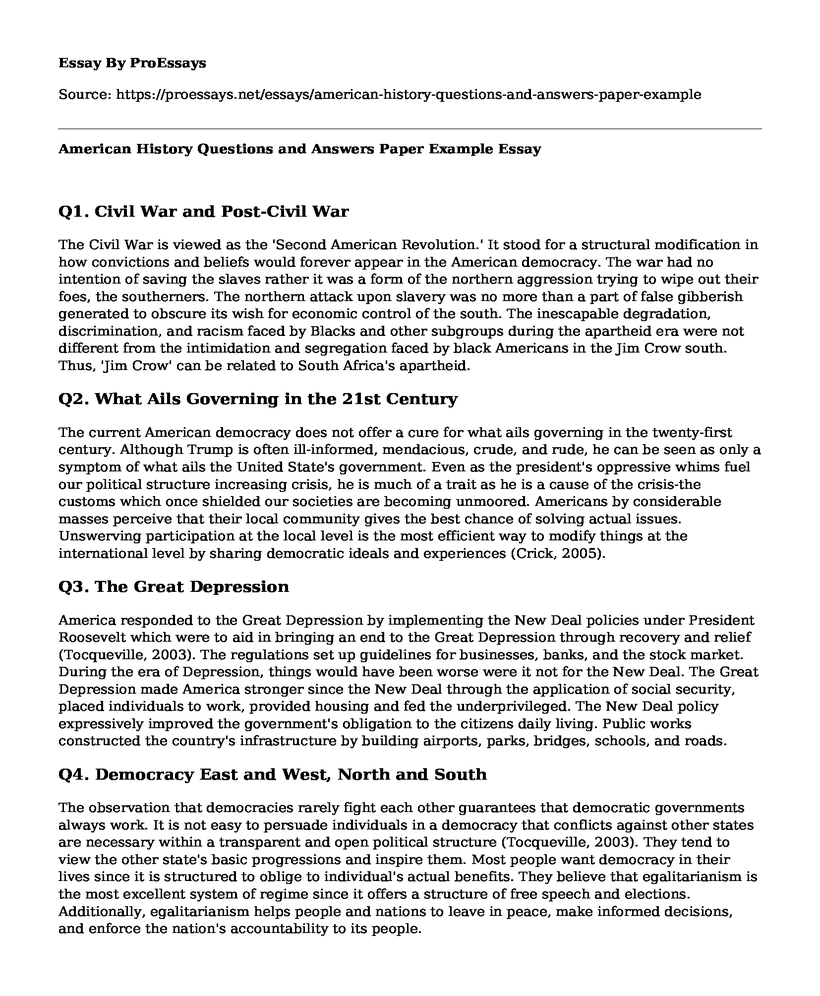Q1. Civil War and Post-Civil War
The Civil War is viewed as the 'Second American Revolution.' It stood for a structural modification in how convictions and beliefs would forever appear in the American democracy. The war had no intention of saving the slaves rather it was a form of the northern aggression trying to wipe out their foes, the southerners. The northern attack upon slavery was no more than a part of false gibberish generated to obscure its wish for economic control of the south. The inescapable degradation, discrimination, and racism faced by Blacks and other subgroups during the apartheid era were not different from the intimidation and segregation faced by black Americans in the Jim Crow south. Thus, 'Jim Crow' can be related to South Africa's apartheid.
Q2. What Ails Governing in the 21st Century
The current American democracy does not offer a cure for what ails governing in the twenty-first century. Although Trump is often ill-informed, mendacious, crude, and rude, he can be seen as only a symptom of what ails the United State's government. Even as the president's oppressive whims fuel our political structure increasing crisis, he is much of a trait as he is a cause of the crisis-the customs which once shielded our societies are becoming unmoored. Americans by considerable masses perceive that their local community gives the best chance of solving actual issues. Unswerving participation at the local level is the most efficient way to modify things at the international level by sharing democratic ideals and experiences (Crick, 2005).
Q3. The Great Depression
America responded to the Great Depression by implementing the New Deal policies under President Roosevelt which were to aid in bringing an end to the Great Depression through recovery and relief (Tocqueville, 2003). The regulations set up guidelines for businesses, banks, and the stock market. During the era of Depression, things would have been worse were it not for the New Deal. The Great Depression made America stronger since the New Deal through the application of social security, placed individuals to work, provided housing and fed the underprivileged. The New Deal policy expressively improved the government's obligation to the citizens daily living. Public works constructed the country's infrastructure by building airports, parks, bridges, schools, and roads.
Q4. Democracy East and West, North and South
The observation that democracies rarely fight each other guarantees that democratic governments always work. It is not easy to persuade individuals in a democracy that conflicts against other states are necessary within a transparent and open political structure (Tocqueville, 2003). They tend to view the other state's basic progressions and inspire them. Most people want democracy in their lives since it is structured to oblige to individual's actual benefits. They believe that egalitarianism is the most excellent system of regime since it offers a structure of free speech and elections. Additionally, egalitarianism helps people and nations to leave in peace, make informed decisions, and enforce the nation's accountability to its people.
Q5. Alternatives to the Modern Practices of Democracies
There are lots of alternatives to the current democratic practices. Any structure which leads to a Trump presidency is not working thus needs to be reformed. A government system referred to as 'epistocracy,' or the law of the conversant can be used as an alternative to democracy. Individuals will need to prove their acquaintance and be tested for their right to exercise civic rights such as voting. Intelligent children, who are unjustly disqualified by democracy, would be able to vote as well. When individuals discern rights, particularly within an excellent political impression, no one will want to lose them, and they cannot be told that they are not qualified to vote.
References
Crick, B. (2005). Populism, politics, and democracy. Democratization, 12(5), 625-632.
De Tocqueville, A. (2003). Democracy in America (Vol. 10). Regnery Publishing.
Cite this page
American History Questions and Answers Paper Example. (2022, Jun 19). Retrieved from https://proessays.net/essays/american-history-questions-and-answers-paper-example
If you are the original author of this essay and no longer wish to have it published on the ProEssays website, please click below to request its removal:
- John Paul Getty Biography
- Diversity in the Land of Liberty Essay
- Research Paper on Pope Innocent III: Greatest Medieval Pope & Reformer
- Essay Example on the Role of Government: Protecting & Sustaining Citizens
- Immigration to US: The Gold Rush Era (1849-1882) - Essay Sample
- Essay on America's Reputation for Democracy: Slavery and Expansion in the 1850s
- What Does It Mean to Be a US Citizen - Essay Sample







